Ever wonder why your Scottish Fold cat seems to become a nighttime vocalist? Is it simply another mystery of the feline kind, or is there more behind those nocturnal meows? While it might feel like a serenade, your Scottish Fold meow at night could be their unique way of communicating their needs and desires. Cats, including your charming Scottish Fold, primarily meow for human interaction rather than chatting with their fellow felines. Their nighttime meowing can be a signal for attention, a cry of hunger, or even an indication of discomfort. Understanding and addressing these vocalizations is crucial in ensuring a peaceful night for both you and your purring companion.
Key Takeaways
- Cats meow mainly to communicate with humans, not other cats.
- A Scottish Fold’s vocalizations can indicate a variety of needs including hunger, attention, or discomfort.
- Addressing and understanding their nighttime meowing is essential for ensuring a peaceful environment.
- Paying close attention to these vocal cues can improve the bond between you and your Scottish Fold.
- Investigating the reasons behind their meows can help in providing targeted care and comfort.
Understanding Your Scottish Fold’s Vocalizations
Want to decipher what your Scottish Fold is trying to tell you with its charming melodies? Understanding cat vocalization is key! Whether it’s a meow, purr, or chirp, each sound your furry friend makes is steeped in purpose. And for Scottish Fold owners, recognizing these vocal cues can be both intriguing and enlightening.
Communication Uniqueness in Cats
Cats use a variety of sounds to communicate with their human companions. Unlike dogs, their vocalization is more nuanced, often varying in pitch, tone, and duration. These vocalizations are their way of expressing needs, comfort, or even displeasure. Identifying the causes of cat meowing can help you respond more appropriately, strengthening the bond with your kitty.
Specific Traits of Scottish Folds
Scottish Folds possess unique traits that can influence their vocal behaviors. Known for their calm and affectionate nature, these cats may use more subtle sounds compared to other breeds. The specific traits of Scottish Folds mean their meowing might often be softer, yet it’s equally compelling. Familiarizing yourself with these breed-specific vocalizations can help you better interpret their messages, whether they relate to hunger, playtime, or discomfort.
Let’s delve deeper into common reasons behind these melodious calls:
| Type of Meow | Possible Cause |
|---|---|
| Short Meow | Greeting or Attention Seeking |
| Prolonged Meow | Discomfort or Loneliness |
| Chirps and Trills | Excitement or Playfulness |
| Soft Purring | Contentment and Affection |
Understanding your cat’s vocalization can thus go a long way in addressing their needs effectively, ensuring a harmonious coexistence with your Scottish Fold.
Why Does My Scottish Fold Cat Meow at Night?
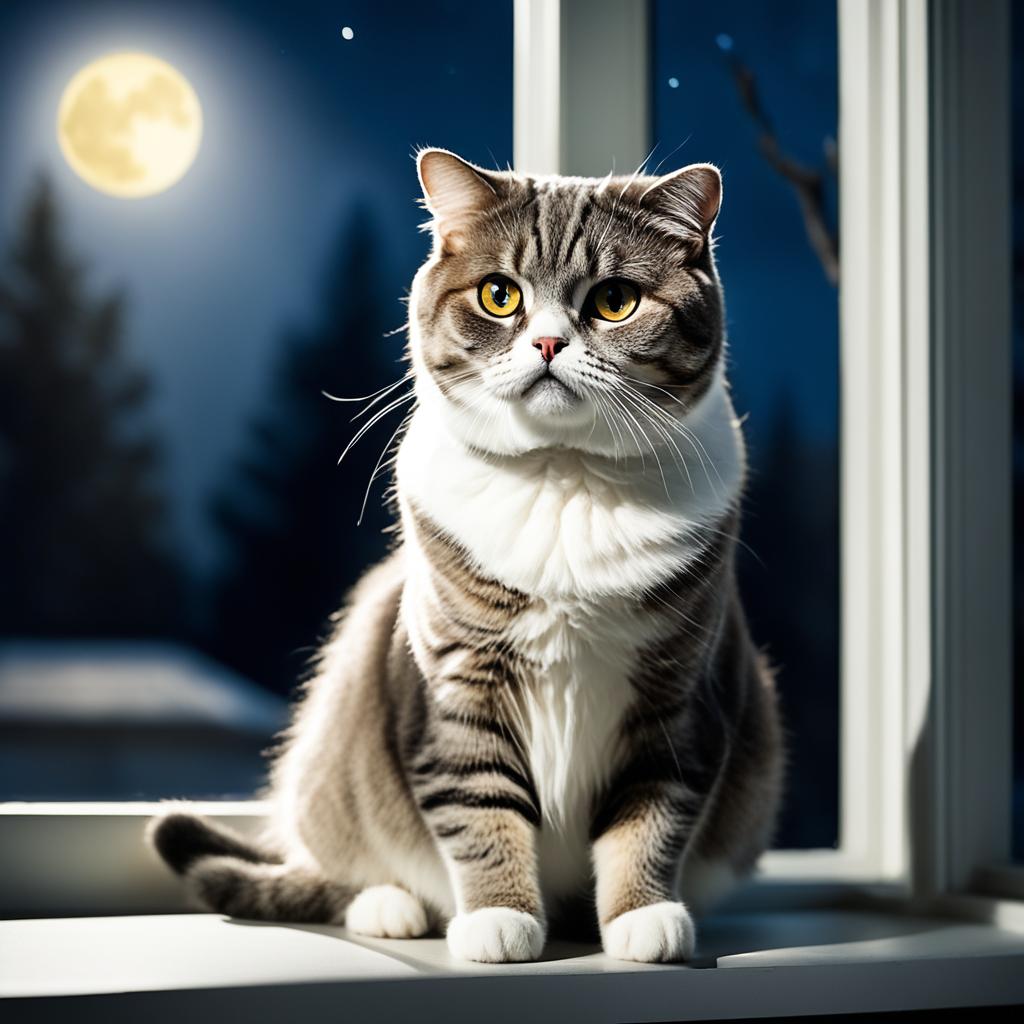
Ever wonder why your Scottish Fold cat belts out a lovely serenade in the wee hours? The *nighttime meowing in cats* can be attributed to quite a few compelling reasons for cat meowing at night. First off, let’s get those nocturnal activity patterns straight—your feline friend is naturally geared to be a night owl.
Hunger strikes often lead to nighttime vocalization. Let’s face it: who doesn’t wake up for a midnight snack? Observing your cat’s routine and feeding schedule can unveil whether hunger is one of the dominant reasons for cat meowing at night.
Another factor to mull over is your cat’s thirst for attention. Scottish Folds aren’t shy about voicing their need for some human interaction—be it petting, playing, or just having a heart-to-heart in the dead of night. Their meows are essentially a furry SOS signal!
Lastly, don’t rule out medical conditions. If your Scottish Fold’s nighttime symphonies start resembling a sad blues number, it might be worth checking for underlying health issues. Analyzing their behavior can immensely help in diagnosing and mitigating the reasons behind nighttime meowing in cats.
| Reasons | Description |
|---|---|
| Hunger | Cats may meow for a nighttime snack due to irregular feeding times. |
| Attention | Seeking interaction or play, especially in the absence of regular human contact. |
| Medical Conditions | Health issues could contribute to increased nighttime vocalizations. |
Natural Sleep Patterns of Cats
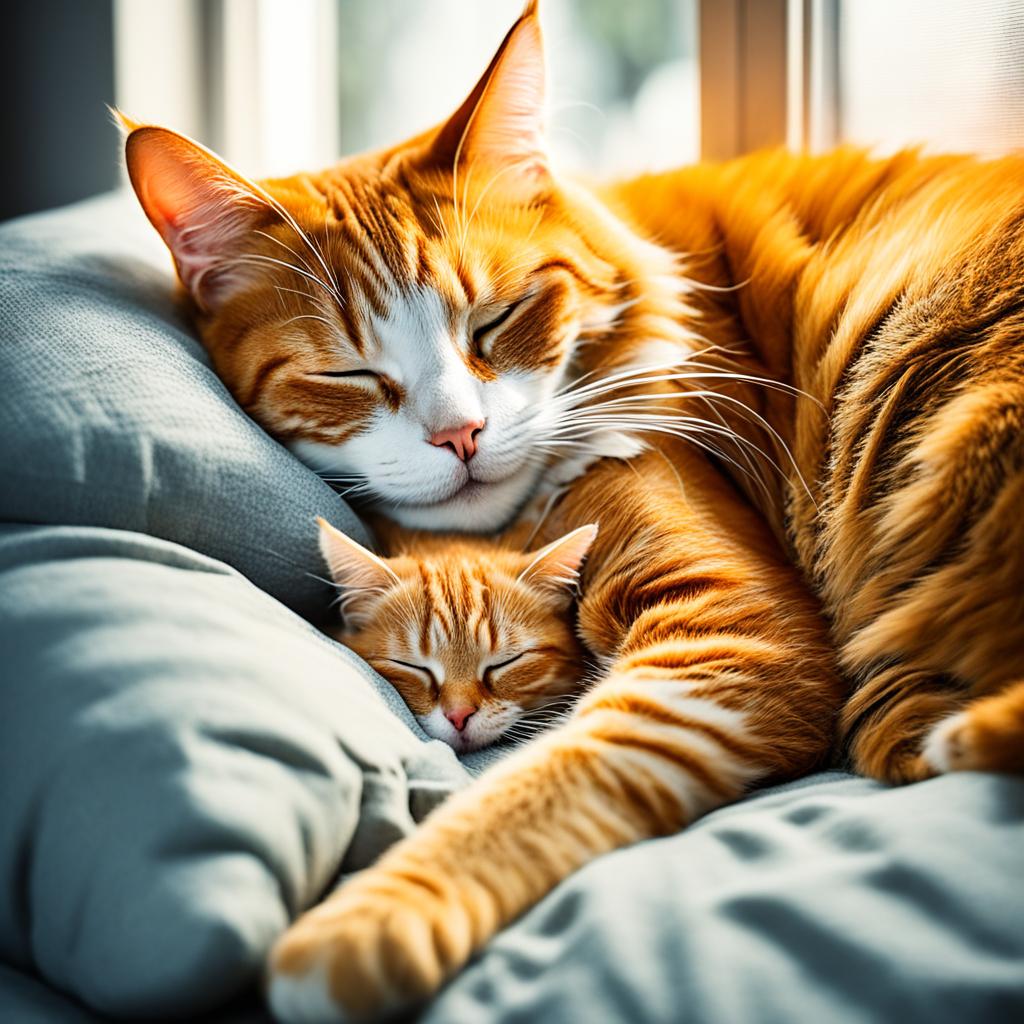
Understanding cat sleep patterns is key to comprehending the nocturnal symphony you often hear. Cats are naturally crepuscular, meaning their activity peaks during dawn and dusk. This behavior is rooted in their wild ancestors’ hunting habits.
Nocturnal and Crepuscular Behavior
Although many believe cats are strictly nocturnal, they actually combine nocturnal behavior in cats with crepuscular tendencies. You’ll find them most active during twilight hours, which can lead to some nighttime activity and vocalizations. Recognizing these patterns helps you better understand your furry friend’s antics.
Adapting Wildlife Habits to Domestic Life
Domestic cats, including Scottish Folds, often exhibit behaviors of their wild counterparts. Their natural tendencies to hunt and explore are retained in their domestic cat habits. Adapting their environment to simulate a hunting routine can minimize disruptions caused by their nocturnal activities.
| Behavior | Wild Cats | Domestic Cats |
|---|---|---|
| Active Hours | Dawn & Dusk | Dawn & Dusk |
| Hunting | Essential | Recreated through play |
| Sleeping | Daytime | Daytime |
By creating a stimulating environment that aligns with your cat’s natural behaviors, you can harmonize their crepuscular nature with your lifestyle. And who knows, maybe both you and your feline friend can enjoy a peaceful night.
Hunger and Meowing: The Connection
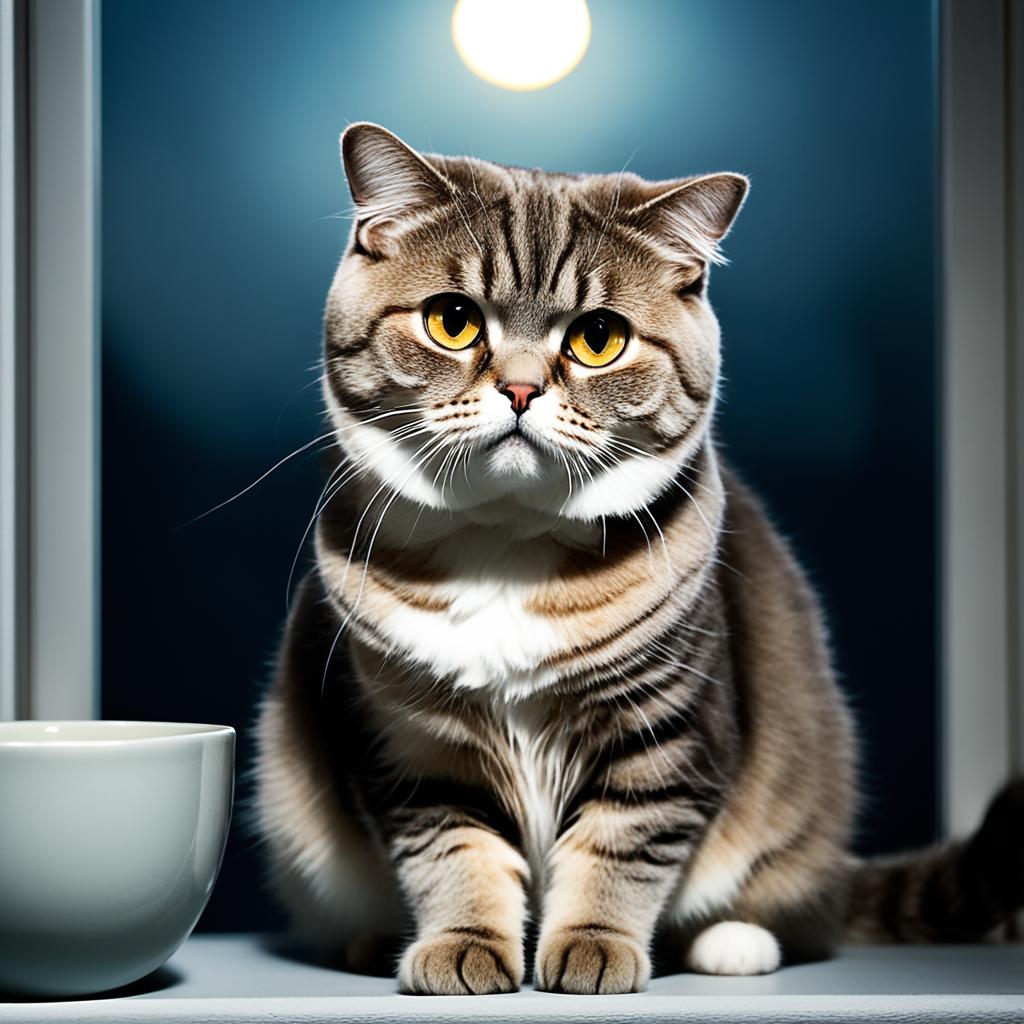
Hunger and meowing often go hand in paw for many cats, especially the vocal Scottish Fold. If your feline friend is serenading you with cat hunger meows in the wee hours, it might be their stomach talking.
Instinctual Feeding Times
Much like their wild ancestors, Scottish Folds prefer having small, frequent meals throughout the day. This feeding schedule for cats mirrors their natural hunting behavior, where they catch multiple prey in a day. Ignoring these instinctual feeding times can result in increased hunger-induced meowing.
Automated Feeders as a Solution
An automatic cat feeder can be a game-changer for owners dealing with nocturnal meowing. These feeders dispense food at scheduled times, ensuring your cat’s hunger is satiated even when you’re not around. Automated feeders cater to a natural feeding schedule for cats, helping you and your cat enjoy peaceful nights.
Consider investing in an automatic feeder and see how much of a difference it makes in reducing those persistent cat hunger meows.
Playtime Needs During Odd Hours
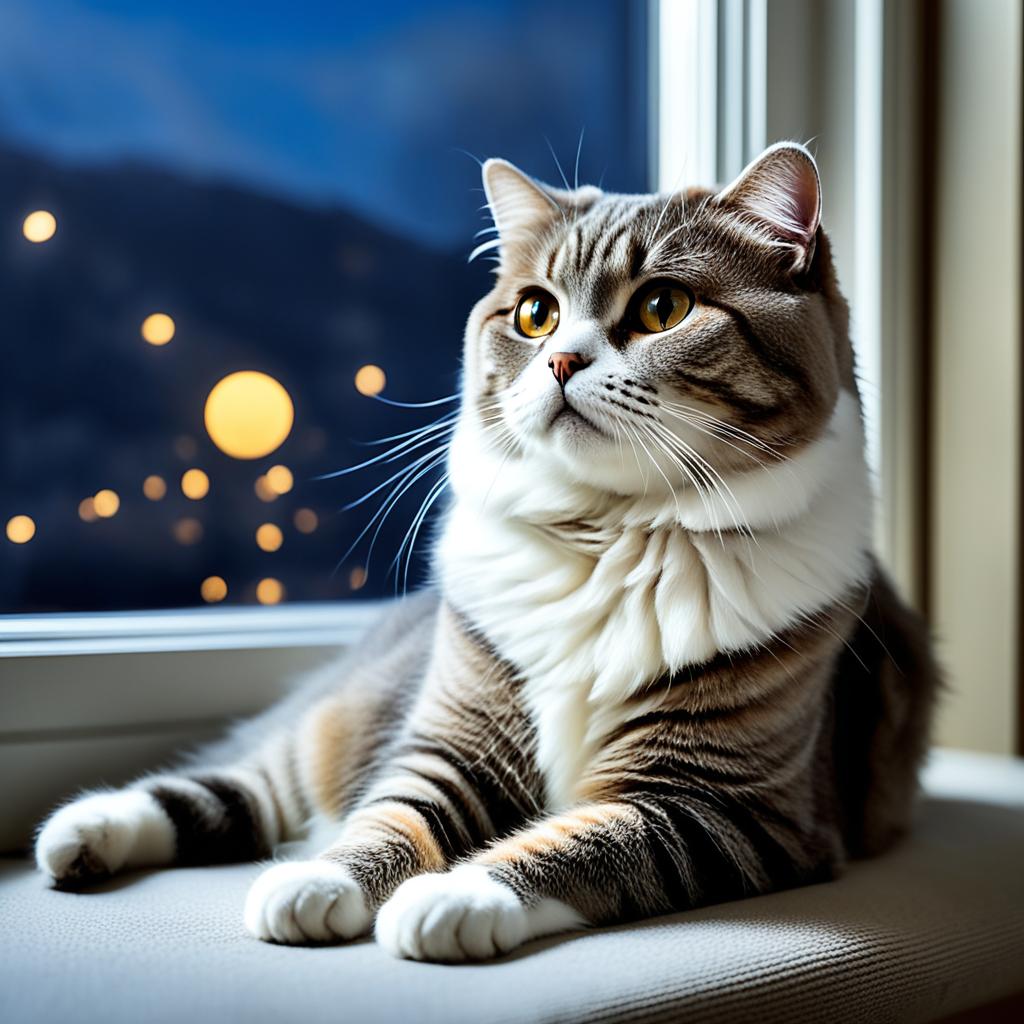
Scottish Folds have a knack for engaging in what is fondly termed as the ‘3 AM Zoomies.’ This behavior can leave you groggy and wondering what drives such bursts of energy in the middle of the night. Understanding the underlying causes can help target ways to reduce their nocturnal escapades.
3 AM Zoomies Explained
The infamous ‘3 AM Zoomies’ are not just random acts of chaos but are rooted in instinctive behaviors. These sudden sprints and playful antics at odd hours stem from your Scottish Fold’s inherent need to burn energy. Such play behavior can be traced back to their wild ancestors who hunted at twilight, yet this instinct remains even in domesticated cats.
Daytime Play Sessions to Burn Energy
To combat these nightly spurts, incorporate consistent play sessions during the day. Structured playtimes are crucial for effectively burning energy in cats, ensuring they are more inclined to rest during nighttime. Interactive toys, feather wands, and laser pointers can all be excellent tools for engaging your Scottish Fold’s play behavior.
Here’s a brief comparison of activities that help in reducing nighttime zoomies:
| Activity | Benefit |
|---|---|
| Interactive Toys | Keeps them mentally and physically stimulated |
| Feather Wands | Simulates hunting, satisfying their predatory instincts |
| Laser Pointers | Encourages agility and swift movement |
| Puzzle Feeders | Engages their problem-solving skills and slows down eating |
By integrating these play activities, you can significantly reduce those nighttime zoomies, ensuring a more peaceful night for both you and your charming Scottish Fold.
Needing the Toilet at Night
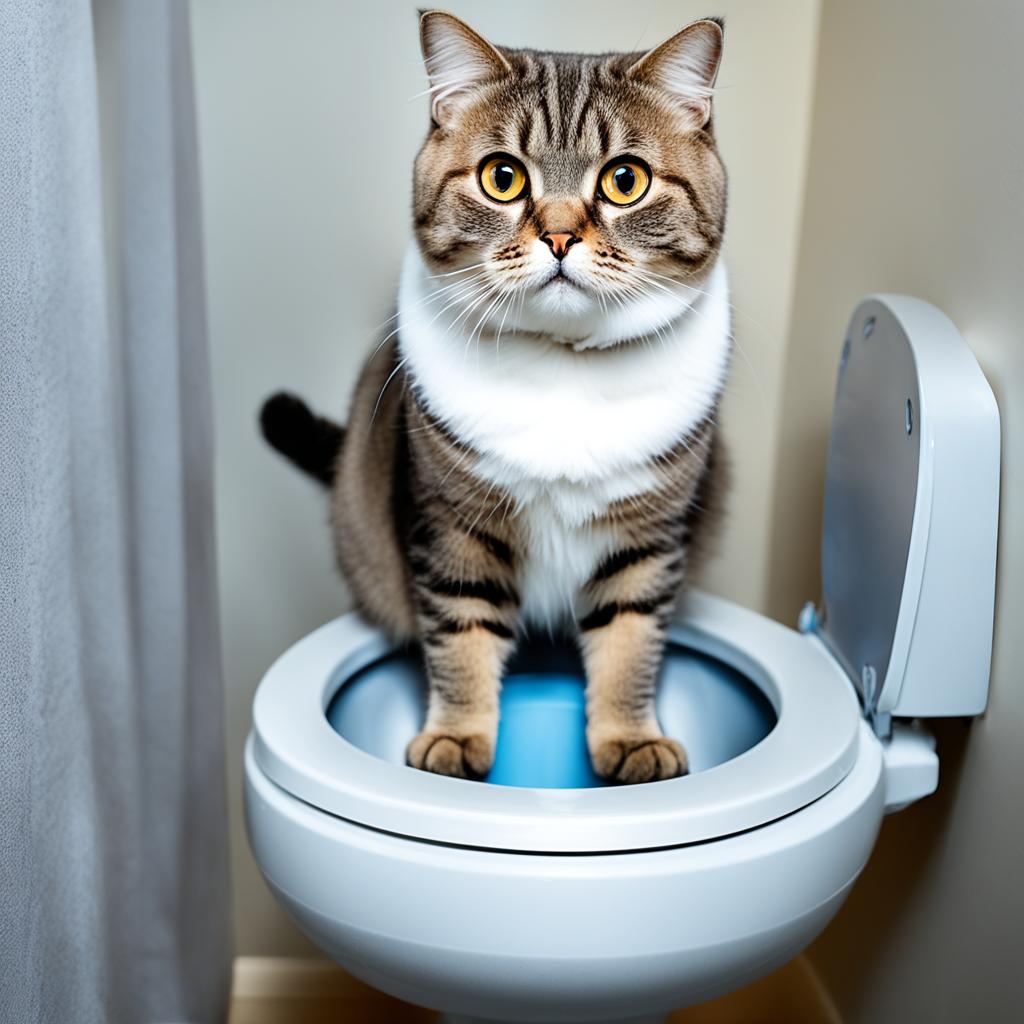
Does your Scottish Fold wake you up in the wee hours with that urgent meow? This might indicate that their nighttime toilet routine needs some attention. A little focus on their litter setup can work wonders.
Impact of Clean Litter Trays
The importance of clean litter trays cannot be overstated. Cats are meticulous creatures, and a dirty litter tray can be a deal-breaker. One way to eliminate those disruptive meows is by ensuring the litter box is fresh and clean. Think of it as their private restroom; wouldn’t you want it to be spotless?
The Role of Cat Flaps
Consider the cat flaps benefits for their nighttime toilet needs. A cat flap allows your feline friend easy access in and out for their bathroom rituals. Independence is a kitty’s best friend, and this nifty tool grants them the freedom they crave without waking you up.
Seeking Companionship or Affection

If your Scottish Fold has been meowing more frequently at night, it’s possible your furry friend is just a cat seeking attention. As you’re probably aware, cats are social animals and thrive on companionship. Extended periods at home, such as during the pandemic, have made them more accustomed to having us around. When night falls, your Scottish Fold may simply miss that constant human interaction.
Not only that, but nighttime companionship for cats can provide them with the reassurance and comfort they crave. Scottish Folds are known for their affectionate nature, and they might express this through nighttime vocalizations. They might want a cozy snuggle or a gentle petting session to feel secure and loved.
Here’s a quick comparison of why your cat might be vocal at night:
| Reason | Description |
|---|---|
| Seeking Attention | Your cat craves interaction and love. |
| Isolation | They may feel lonely or isolated when you’re not around. |
| Routine Changes | Changes in routine, such as more time spent at home, can heighten their need for companionship. |
To help address this, you might consider engaging more with your Scottish Fold during the evening. Perhaps incorporate some extra playtime or affectionate petting sessions before bed. This way, your Scottish Fold might feel more content and less likely to awaken the entire household with their nocturnal serenades.
Medical Issues Causing Nighttime Meowing

When your Scottish Fold transforms into a nightly serenader, it could be more than just a quirky habit. Underlying cat health issues can often cause increased vocalization at night, and it’s essential to be aware of these conditions to provide the best care for your feline friend.
Hyperthyroidism and Increased Vocalization
Hyperthyroidism in cats is a common endocrine disorder that amps up their metabolism, leading to various symptoms including excessive meowing. If your cat’s midnight arias seem unending and they’re also losing weight or acting restless, hyperthyroidism could be the culprit. Regular vet visits and appropriate treatments can help keep this condition in check.
Blood Pressure Concerns
Feline blood pressure is another critical health metric that shouldn’t be overlooked. Just like in humans, high blood pressure can affect cats as they age. Elevated blood pressure may cause increased vocalization due to discomfort or confusion, especially noticeable during the quiet hours of the night.
Kidney Disease Impacts
Kidney disease in cats is another significant health issue that can lead to restless nights. Cats suffering from kidney disease may experience discomfort or pain, prompting them to meow more frequently at night. Regular medical checkups are crucial to catch kidney issues early and manage them effectively.
Here’s a concise comparison of these conditions and their symptoms:
| Condition | Common Symptoms | Impact on Meowing |
|---|---|---|
| Hyperthyroidism | Weight loss, restlessness | Increased vocalization |
| High Blood Pressure | Disorientation, vision issues | Frequent nighttime meowing |
| Kidney Disease | Increased thirst, lethargy | Heightened vocalization at night |
Your Scottish Fold’s serenades may be cute, but they could also signal serious cat health issues. Keeping an eye on their behavior and arranging regular vet checkups can help ensure that your kitty stays healthy and well.
Lack of Stimulation and Boredom

A bored cat can be a meowing cat, and this rings especially true for the curious Scottish Fold. To curb those nighttime vocalizations, consider the importance of varied mental and physical stimulation.
Importance of Environmental Enrichment
Environmental enrichment plays a pivotal role in keeping your Scottish Fold engaged and content. This involves creating a stimulating habitat that mimics the challenges they might face in the wild. Adding vertical spaces like cat trees and shelves not only provides a place to climb and explore but also offers a fantastic perch to survey their kingdom.
Interactive Toys and Puzzles
Interactive cat toys are lifesavers when it comes to battling boredom in cats. Toys that move, emit sounds, or require a bit of feline ingenuity can captivate your Scottish Fold for hours. Puzzle feeders, for example, combine the thrill of hunting with the reward of food, satisfying both their dietary needs and playful instincts.
- Interactive balls and laser pointers
- Puzzle feeders and treat dispensers
- Cat tunnels and hideaways
By incorporating these elements into their daily routine, you can ensure your feline friend remains happy, healthy, and less likely to serenade you at odd hours.
| Interactive Toy | Feature | Benefit |
|---|---|---|
| Motorized Mouse | Simulates Prey | Keeps cat active and engaged |
| Puzzle Feeder | Food Dispenser | Encourages hunting instincts |
| Cat Tree | Multiple Levels | Provides climbing and scratching areas |
Implementing these strategies not only helps in providing essential cat environmental enrichment but also reduces the likelihood of boredom in cats. So, invest in some interactive cat toys and watch your Scottish Fold’s meows turn from persistent pleas to purrs of satisfaction.
Addressing Separation Anxiety
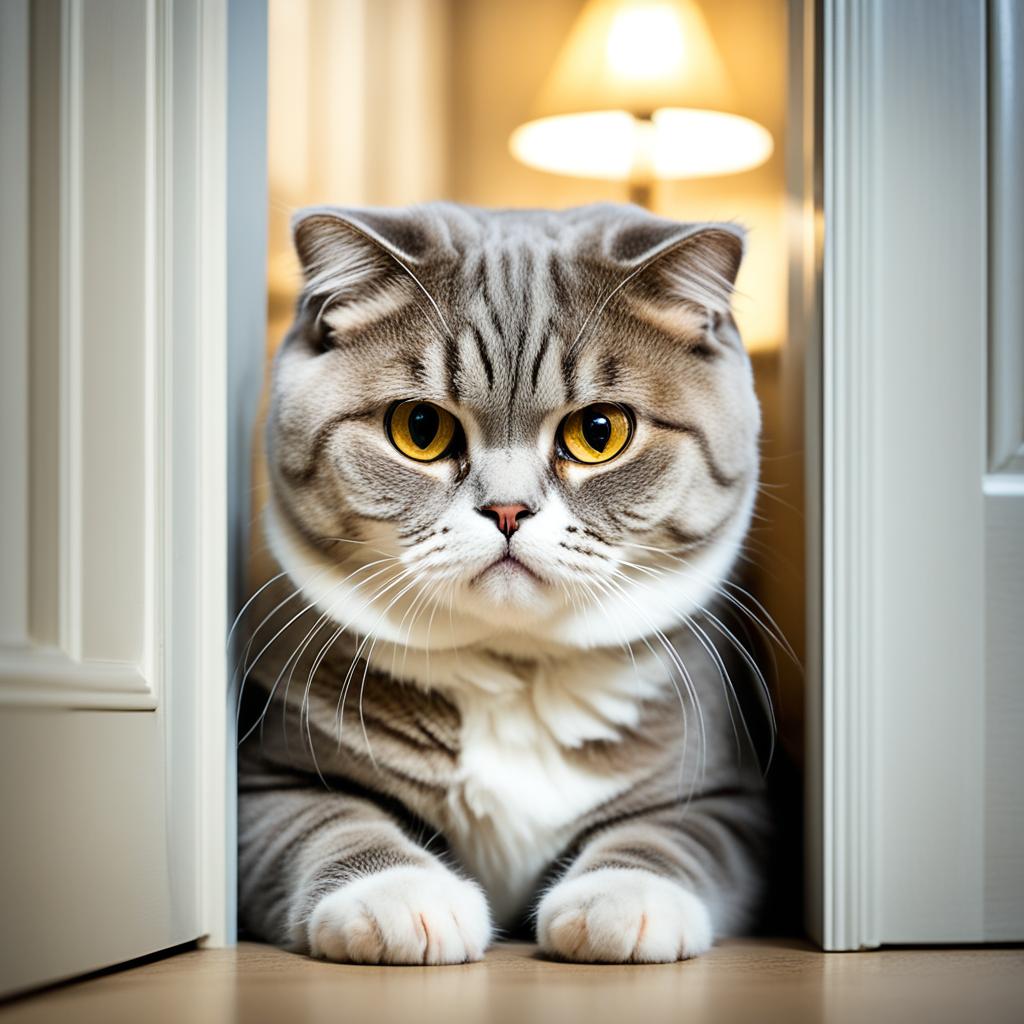
Separation anxiety in your beloved Scottish Fold can be quite an odyssey, especially with the increasing attachment formed during the COVID-19 pandemic. This bond, although heartwarming, might leave your furball feeling distressed during your absence, particularly at night.
Increased Attachment During COVID-19
The impact of COVID-19 on cats has been significant, with many people working from home and spending more time with their pets. This shift has led to increased attachment, causing stress when routines abruptly change again. Your Scottish Fold might express this newfound anxiety through vocalizations at night, a plea for reassurance and comfort.
Nighttime Separation Solutions
Addressing cat separation anxiety involves creating a soothing nighttime environment. Consider the following strategies:
- Maintain a consistent bedtime routine to provide stability.
- Leave a piece of clothing with your scent in their sleeping area.
- Introduce calming aids such as pheromone diffusers or toys.
These adjustments can help ease your cat’s anxiety, potentially reducing nighttime disruptions and fostering a more peaceful household.
Recommendations for Reducing Nighttime Meowing
Addressing those nocturnal serenades from your Scottish Fold can make a world of difference to your sleep quality and your cat’s well-being. Here are some curated recommendations to help bring peace to your nights.
Medical Checkups
Scheduling regular visits to the vet ensures your Scottish Fold isn’t meowing due to underlying health issues. Health problems such as hyperthyroidism or high blood pressure can contribute to nighttime disturbances. Early detection through consistent medical checkups can lead to the right solutions for cat nighttime meowing.
Behavioral Changes and Solutions
Implementing cat behavior modification strategies can significantly reduce nighttime meowing. Attempt to create a structured playtime and feeding schedule to satisfy your cat’s natural desires and prevent boredom. Interactive toys and puzzle feeders can keep your Scottish Fold entertained and mentally stimulated.
Creating an Ideal Night Environment
A better sleep environment for cats involves a comfortable and quiet area where your pet can relax. Ensure the space is free from disturbances and has cozy bedding. Additionally, for those needing more intensive solutions, consider white noise machines to mask external sounds that might trigger meowing.
| Recommendation | Benefits |
|---|---|
| Medical Checkups | Early detection and treatment of health issues |
| Behavioral Changes | Reduces boredom and aligns with natural instincts |
| Ideal Night Environment | Promotes undisturbed sleep and relaxation |
Conclusion
Addressing your Scottish Fold’s nighttime meowing requires a nuanced and multifaceted approach. By understanding their unique behaviors and needs, you can tailor solutions to ensure more peaceful nights. Whether it’s accommodating their crepuscular nature, managing their hunger with automated feeders, or offering more stimulating playtime, each action you take brings you closer to a restful night.
Don’t underestimate the power of a clean litter tray and access to the outdoors via a cat flap. These simple adjustments can make a world of difference. If medical issues are contributing to the vocalizations, regular checkups are crucial. Tackling hyperthyroidism, high blood pressure, or kidney disease early can mitigate much of the nighttime disruption.
Lastly, creating an enriched environment with interactive toys and puzzles not only combats boredom but also provides necessary mental stimulation. By considering these tips and implementing the appropriate changes, you can achieve a harmonious household where both you and your Scottish Fold enjoy peaceful nights.
FAQ
Why does my Scottish Fold cat meow at night?
Your Scottish Fold may meow at night for reasons including hunger, the need for attention, discomfort, or medical conditions. Observing their routine can help pinpoint and address the cause.
Are Scottish Folds more vocal at night compared to other breeds?
Scottish Folds may follow typical feline nocturnal patterns. Their specific traits, such as a desire for companionship or certain health issues, might influence their nighttime vocalizations.
How does a cat’s sleeping pattern affect its nighttime behavior?
Cats are crepuscular, so they are naturally active at dawn and dusk. This pattern can lead to more nighttime activity and vocalization, which is normal but can be managed through environmental adjustments.
Can feeding schedules influence my cat’s nighttime meowing?
Yes, Scottish Folds have an instinctual preference for small, frequent meals. Aligning their feeding schedule with this behavior, potentially using an automated feeder, can reduce nighttime meowing caused by hunger.
What are the ‘3 AM Zoomies’ in Scottish Folds?
The ‘3 AM Zoomies’ refer to sudden bursts of energy that can occur at night. This natural behavior can be minimized by incorporating more interactive play sessions during the day to burn off excess energy.
Does my cat’s litter tray affect its nighttime meowing?
A dirty litter tray can definitely cause nighttime meowing. Keeping the litter tray clean and easily accessible, possibly with a cat flap, can reduce vocalizations related to toileting needs.
Could my Scottish Fold be meowing at night for attention?
Absolutely. If your cat is accustomed to human interaction, especially during times like increased working from home, it might meow for companionship and affection at night.
How can health issues cause nighttime meowing in Scottish Folds?
Health issues such as hyperthyroidism, high blood pressure, and kidney disease can lead to increased nighttime vocalization. Regular medical checkups are crucial for early detection and management.
How do I keep my Scottish Fold from getting bored at night?
Providing environmental enrichment through interactive toys and puzzles can help keep your Scottish Fold engaged and possibly reduce nighttime boredom and subsequent meowing.
How did the COVID-19 pandemic affect my cat’s nighttime behavior?
The increased attachment resulting from changes in routine during COVID-19 may lead to separation anxiety, which can manifest through nighttime meowing. Creating comforting night environments and adjusting routines can help.
What are the best strategies to reduce nighttime meowing in Scottish Folds?
Addressing nocturnal meowing involves routine medical checkups, implementing behavioral modifications, and creating a comforting sleep environment to foster better sleep habits for both your Scottish Fold and you.




